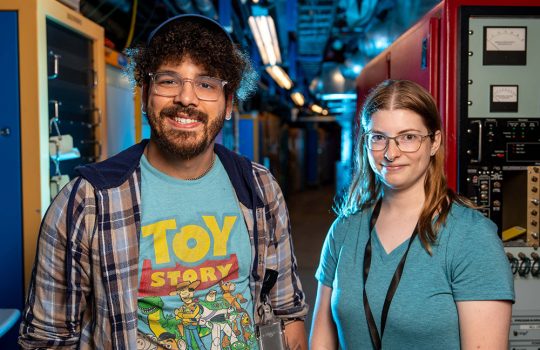BATAVIA, Ill.—A select group of 24 high school science teachers from across the country will share the singular opportunity to bring the high-energy physics frontier back to their classrooms through the QuarkNet teacher training workshop July 1-6 at the Snowmass Conference Center, during the three-week conference “Snowmass 2001: A Summer Study on the Future of Particle Physics.”
QuarkNet, a nationwide collaboration of 36 universities and research institutions, uses the web (which was developed by particle physicists) to connect high school students with real-life data from ongoing high-energy physics experiments at Fermilab, the U.S. Department of Energy national laboratory operating the world’s most powerful particle accelerator, the Tevatron. And later this decade, students will also connect on-line with experiments at CERN, the European Laboratory for Particle Physics in Geneva, Switzerland.
“Part of our commitment as physics researchers is to reach out to students who will be the next generation of our nation’s scientists,” says Randal Ruchti of the University of Notre Dame, one of QuarkNet’s original sponsoring institutions.
After their intense week of training at Snowmass, the 24 science teachers will disperse to spend the rest of the summer doing the equivalent of graduate student work on high-energy physics experiments, at Fermilab, at CERN, or at their sponsoring institutions. They will work alongside physicist mentors, experiencing the day-to-day realities of what must go into an experiment before any new discoveries can be produced. They will take those experiences back to their classrooms, offering first-hand 21st century insights into the classical physics principles dating back to Isaac Newton.
“QuarkNet gives working physicists an opportunity to get directly involved with teachers and high-school kids, and to help them participate in scientific research and discovery,” adds Ruchti, a collaborator at Fermilab’s DZero collider detector.
This third annual QuarkNet teacher training workshop is the first to be held at Snowmass, where some 750 of the nation’s top particle physicists will be gathered to assess the future of their field. The previous two QuarkNet workshops have already begun to influence that future with results like these in classrooms across the country:
- a Texas teacher and his physics class assembled a Plexiglas cloud chamber, a cubic meter in size, tracking the paths of cosmic rays through their classroom;
- an Iowa teacher arranged for his class to spend a semester working as research assistants on a particle physics experiment at nearby Iowa State University;
- a Virginia teacher taught an entire first semester of physics with the theme, “The Hunt for the Higgs,” illustrating such classical principles as conservation of energy and momentum in the context of research into the particle postulated as the source of mass for all other elementary particles;
- a teacher in Long Island, New York brought a quantity of scintillating plastic back to his class, where his students used it to measure the lifespan of the muon particle.
As a bonus, the Long Island teacher also earned the privilege of introducing the noted science writer Dava Sobel (Galileo’s Daughter, Longitude) at a collaboration meeting of ATLAS, a collider detector being built for CERN’s Large Hadron Collider. ATLAS, another CERN detector collaboration, the Compact Muon Solenoid, and Fermilab’s DZero and CDF collider detector collaborations, are major participants in QuarkNet.
During its five-year launching phase, QuarkNet aims to build a network of 60 research centers (adding 12 institutions each year from among the four collider detector collaborations), connecting high school classes with these world-class particle physics experiments. This year’s participating institutions are: Argonne National Laboratory; Duke University; Florida Institute of Technology; Iowa State University; Lawrence Berkeley National Laboratory; Rutgers University; Texas Tech University; University of California at Davis; University of Iowa; University of Kansas and University of Mississippi.
Each member institution sponsors two area high school teachers for training and mentoring. They become “lead teachers,” and are in turn responsible for training 10 more teachers through local workshops. In this way, QuarkNet hopes to reach 720 high school science teachers and several thousand students across the country.
The QuarkNet Project is supported in part by the National Science Foundation http://www.nsf.gov and the U.S. Department of Energy http://www.energy.gov. For more information, visit the QuarkNet website at http://quarknet.fnal.gov
“Snowmass 2001” represents a unique opportunity to gain new insights into the world around us. To arrange coverage of this world-class science gathering, visit the Web at
http://www.fnal.gov/pub/snowmass/media_registration.html.
Fill out the registration form, and submit it electronically; or print it and fax it to Fermilab’s Office of Public Affairs at 630-840-8780.
For more on the conference and schedule, visit Snowmass2001.org.
Fermilab, offering organizational and logistical support for Snowmass 2001, is operated by Universities Research Association, Inc., under contract with the U.S. Department of Energy.



